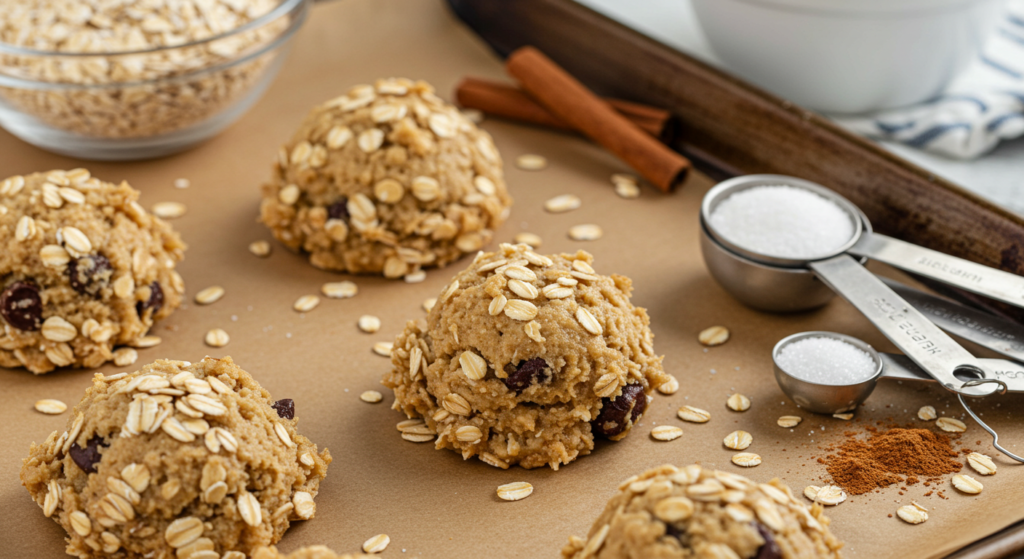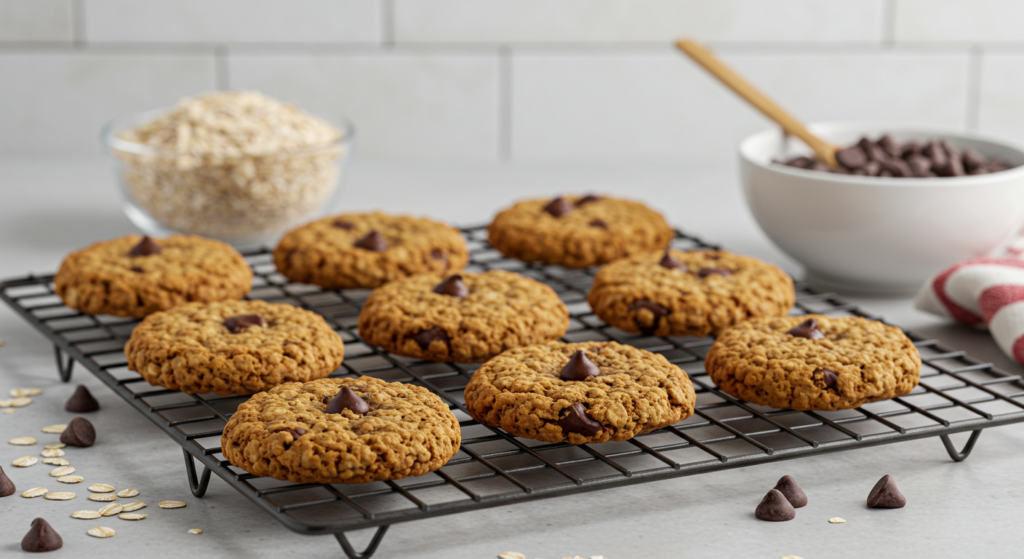When it comes to baking oatmeal cookies, the type of oats you use can make a world of difference. Many recipes call for rolled oats, known for their hearty texture and nutty flavor. But what if you only have instant oats on hand? Can you use instant oats instead of rolled oats in cookies? This is a common question among home bakers, and the answer isn’t as straightforward as it might seem.
In this guide, we’ll dive into the differences between instant oats and rolled oats, how they affect cookie texture and flavor, and whether substituting one for the other is a good idea. Whether you’re an experienced baker or just starting out, this comprehensive guide will help you make an informed decision for your next batch of cookies.
Understanding the Difference Between Instant and Rolled Oats
What Are Rolled Oats?
Rolled oats are oat groats that have been steamed and flattened with large rollers. They retain much of their texture and are slightly chewy, making them ideal for baking. Rolled oats absorb liquid slowly, giving cookies their signature bite and helping to maintain structure. These oats are a staple in many classic recipes due to their hearty flavor and versatility.
What Are Instant Oats ?
Instant oats, on the other hand, are processed further. They’re pre-cooked, dried, and rolled thinner than rolled oats, which allows them to cook faster. While convenient for quick breakfasts, instant oats lack the texture and structure of rolled oats. Their fine consistency can turn cookies soft and less chewy, potentially altering the overall outcome of your recipe.
Key Differences Between Instant and Rolled Oats
The primary differences lie in texture, moisture absorption, and cooking time. Rolled oats offer a firm, chewy texture, while instant oats tend to blend into the dough, creating a softer cookie. Additionally, instant oats absorb liquid faster, which might affect the dough’s consistency. These distinctions are crucial when deciding whether to use instant oats in place of rolled oats in your cookies.
How Oat Types Affect Cookie Texture and Flavor
The Role of Oats in Cookie Recipes
When it comes to baking, oats do more than just add fiber—they play a significant role in the texture and structure of cookies. Rolled oats are often used in recipes for their ability to create a chewy bite and a hearty texture. They retain their shape during baking, giving cookies that classic rustic look and mouthfeel.
On the other hand, instant oats are thinner and more processed, which can cause them to break down faster during baking. This means they may not provide the same chewiness or structure as rolled oats. For recipes like oatmeal cookies, understanding these differences is key to answering the question, Can you use instant oats instead of rolled oats in cookies ?

Instant Oats vs. Rolled Oats in Cookies
Substituting instant oats for rolled oats in cookies can lead to noticeable changes. Instant oats tend to absorb more liquid and do so faster, which may make the cookie dough thicker or less pliable. This can result in cookies that spread less and have a denser, softer texture.
Rolled oats, with their larger size and slower absorption rate, allow for a more even spread and a distinct chewiness. If you’re aiming for cookies with a hearty texture and a classic oatmeal cookie flavor, rolled oats are typically the better choice. However, for a softer cookie that melts in your mouth, instant oats might be a worthwhile experiment.
For related baking tips and ingredient substitutions, check out other cookie recipes on Nirvana Recipes.
Substituting Instant Oats for Rolled Oats
Tips for Substituting Instant Oats
If you find yourself asking, Can you use instant oats instead of rolled oats in cookies? the answer largely depends on the recipe and your preferences. To substitute successfully, use the same quantity of instant oats as the recipe calls for in rolled oats. Be mindful of their absorbency and consider adding a tablespoon or two of extra liquid to the dough to maintain the desired consistency.
Another trick is to blend the instant oats slightly in a food processor to mimic the texture of rolled oats. This helps balance the dough’s structure and prevents it from becoming overly dense.
When Substitution May Not Work
While instant oats can work in some cookie recipes, there are situations where they may not be ideal. For example, in recipes where the oats are meant to provide a chewy texture or act as a structural component, instant oats may fall short. Additionally, if a recipe requires long baking times, instant oats can break down too much, resulting in a mushy texture.
For recipes where texture is paramount, such as oatmeal raisin or classic chocolate chip oatmeal cookies, it’s best to stick with rolled oats. Experimenting with instant oats can still yield delicious results, but understanding their limitations will help you achieve the best outcome.
FAQs About Using Instant Oats in Cookies
Can You Use Instant Oats in All Baking Recipes ?
A common question among bakers is, Can you use instant oats instead of rolled oats in cookies? While instant oats work in many recipes, they’re not a universal substitute. Instant oats absorb liquid faster than rolled oats, which can make batters and doughs thicker than intended. This characteristic might be fine for cookies but can cause issues in other baked goods like granola bars or breads, where texture and structure depend on rolled oats.
Do Instant Oats Make Cookies Less Chewy ?
Yes, instant oats tend to produce cookies that are softer and less chewy. Rolled oats retain their shape during baking, giving cookies that satisfying bite. On the other hand, instant oats break down more easily, blending into the dough and resulting in a smoother, softer texture. If chewiness is a key characteristic you’re after, rolled oats are the better option.
What Adjustments Are Needed When Using Instant Oats ?
When substituting instant oats for rolled oats, adjust the liquid content slightly to prevent the dough from becoming too dry. Adding a tablespoon or two of milk, water, or oil can help maintain the desired texture. Also, keep an eye on baking time, as cookies made with instant oats may bake faster due to their finer texture.
Are Instant Oats as Nutritious as Rolled Oats ?
Both instant and rolled oats offer similar nutritional benefits, including fiber, protein, and essential vitamins. However, instant oats are more processed, which can result in slightly higher glycemic index values. If you’re looking for a healthier option with a lower glycemic impact, rolled oats may be the better choice.
Creative Cookie Recipes with Instant Oats
Easy Instant Oatmeal Chocolate Chip Cookies
Looking for a quick and easy recipe to test whether you can use instant oats instead of rolled oats in cookies? Try making chocolate chip cookies with instant oats! Combine softened butter, brown sugar, and vanilla in a bowl. Add an egg, instant oats, flour, and baking soda. Fold in chocolate chips, then bake at 350°F (175°C) for 10–12 minutes. These cookies come out soft, sweet, and perfect for a quick treat .
Spiced Oatmeal Raisin Cookies with Instant Oats
For a warm, flavorful twist, use instant oats to make spiced oatmeal raisin cookies. Mix cinnamon, nutmeg, and a dash of ginger into your dough, along with raisins and chopped walnuts. The instant oats blend beautifully with the spices, creating a cookie that’s soft and fragrant. This recipe is proof that even if you swap oats, you can still achieve a delightful outcome.

Conclusion and Final Thoughts
When to Use Instant Oats in Baking
The question, Can you use instant oats instead of rolled oats in cookies?, depends on the outcome you’re aiming for. Instant oats are convenient and can work well in recipes where a softer, less textured cookie is acceptable. They’re great for creating quick, fuss-free cookies that still taste delicious. However, for cookies where chewiness and structure are essential, rolled oats remain the better choice.
It’s worth noting that while instant oats can be a handy substitute, they may require small adjustments to your recipe. Adding a bit of extra liquid and closely monitoring baking times can help ensure success. Understanding the role of oats in your recipe is key to deciding when and how to make the switch.
Encouragement to Experiment
Ultimately, baking is as much about creativity as it is about precision. Trying different types of oats can be a fun experiment that helps you discover your perfect cookie recipe. Whether you stick with rolled oats for tradition or use instant oats for convenience, the results will likely be tasty and satisfying. So, don’t hesitate to experiment and make the recipe your own!
Additional Resources and Recipe Variations
Explore More Baking Options with Oats
If you’ve enjoyed experimenting with the question Can you use instant oats instead of rolled oats in cookies?, why stop there? Oats are a versatile ingredient that works beautifully in other baked goods like muffins, granola bars, and even savory crackers. For example, instant oats can be blended into flour for a gluten-free alternative or used as a topping for crumbles and crisps.
For those who love variety, try blending rolled oats and instant oats in your recipes to balance texture and convenience. This can create a cookie that’s soft yet retains a slight chew, giving you the best of both worlds.
Related Recipes for Inspiration
For more oat-based recipes and baking tips, explore other dessert ideas on Nirvana Recipes. From classic oatmeal cookies to inventive creations like oatmeal banana muffins, you’ll find plenty of ways to make oats a star ingredient in your kitchen.
Whether you’re using rolled oats or instant oats, the versatility of this pantry staple ensures that your baking adventures will always be rewarding. Happy baking !

